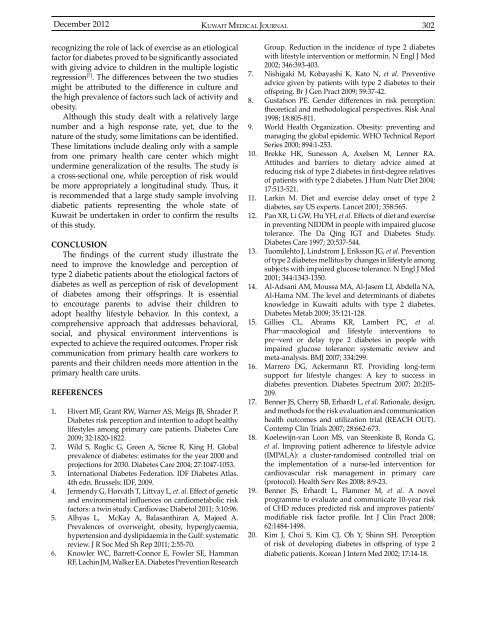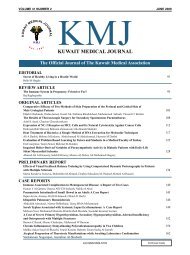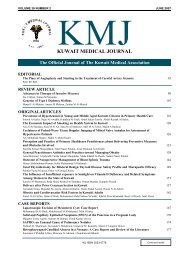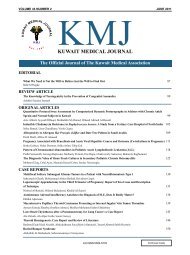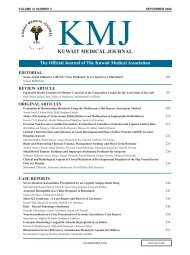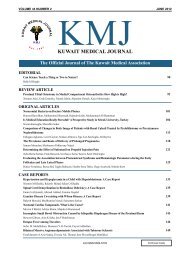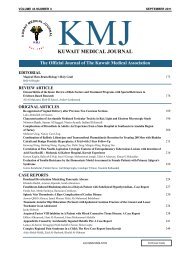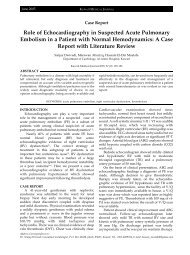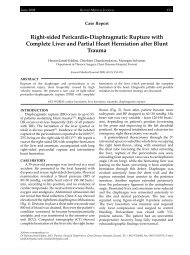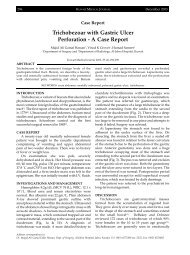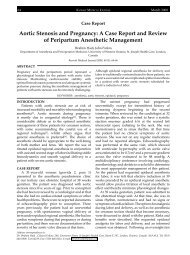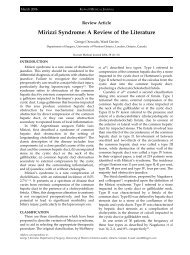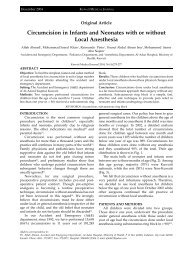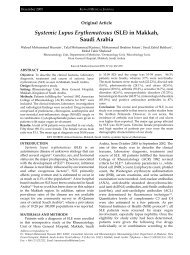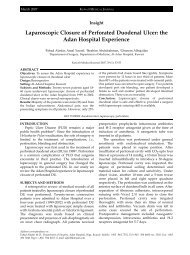Vol 44 # 4 December 2012 - Kma.org.kw
Vol 44 # 4 December 2012 - Kma.org.kw
Vol 44 # 4 December 2012 - Kma.org.kw
Create successful ePaper yourself
Turn your PDF publications into a flip-book with our unique Google optimized e-Paper software.
<strong>December</strong> <strong>2012</strong><br />
KUWAIT MEDICAL JOURNAL 302<br />
recognizing the role of lack of exercise as an etiological<br />
factor for diabetes proved to be significantly associated<br />
with giving advice to children in the multiple logistic<br />
regression [7] . The differences between the two studies<br />
might be attributed to the difference in culture and<br />
the high prevalence of factors such lack of activity and<br />
obesity.<br />
Although this study dealt with a relatively large<br />
number and a high response rate, yet, due to the<br />
nature of the study, some limitations can be identified.<br />
These limitations include dealing only with a sample<br />
from one primary health care center which might<br />
undermine generalization of the results. The study is<br />
a cross-sectional one, while perception of risk would<br />
be more appropriately a longitudinal study. Thus, it<br />
is recommended that a large study sample involving<br />
diabetic patients representing the whole state of<br />
Kuwait be undertaken in order to confirm the results<br />
of this study.<br />
CONCLUSION<br />
The findings of the current study illustrate the<br />
need to improve the knowledge and perception of<br />
type 2 diabetic patients about the etiological factors of<br />
diabetes as well as perception of risk of development<br />
of diabetes among their offsprings. It is essential<br />
to encourage parents to advise their children to<br />
adopt healthy lifestyle behavior. In this context, a<br />
comprehensive approach that addresses behavioral,<br />
social, and physical environment interventions is<br />
expected to achieve the required outcomes. Proper risk<br />
communication from primary health care workers to<br />
parents and their children needs more attention in the<br />
primary health care units.<br />
REFERENCES<br />
1. Hivert MF, Grant RW, Warner AS, Meigs JB, Shrader P.<br />
Diabetes risk perception and intention to adopt healthy<br />
lifestyles among primary care patients. Diabetes Care<br />
2009; 32:1820-1822.<br />
2. Wild S, Roglic G, Green A, Sicree R, King H. Global<br />
prevalence of diabetes: estimates for the year 2000 and<br />
projections for 2030. Diabetes Care 2004; 27:1047-1053.<br />
3. International Diabetes Federation. IDF Diabetes Atlas.<br />
4th edn. Brussels: IDF, 2009.<br />
4. Jermendy G, Horváth T, Littvay L, et. al. Effect of genetic<br />
and environmental influences on cardiometabolic risk<br />
factors: a twin study. Cardiovasc Diabetol 2011; 3:10:96.<br />
5. Alhyas L, McKay A, Balasanthiran A, Majeed A.<br />
Prevalences of overweight, obesity, hyperglycaemia,<br />
hypertension and dyslipidaemia in the Gulf: systematic<br />
review. J R Soc Med Sh Rep 2011; 2:55-70.<br />
6. Knowler WC, Barrett-Connor E, Fowler SE, Hamman<br />
RF, Lachin JM, Walker EA. Diabetes Prevention Research<br />
Group. Reduction in the incidence of type 2 diabetes<br />
with lifestyle intervention or metformin. N Engl J Med<br />
2002; 346:393-403.<br />
7. Nishigaki M, Kobayashi K, Kato N, et al. Preventive<br />
advice given by patients with type 2 diabetes to their<br />
offspring. Br J Gen Pract 2009; 59:37-42.<br />
8. Gustafson PE. Gender differences in risk perception:<br />
theoretical and methodological perspectives. Risk Anal<br />
1998; 18:805-811.<br />
9. World Health Organization. Obesity: preventing and<br />
managing the global epidemic. WHO Technical Report<br />
Series 2000; 894:1-253.<br />
10. Brekke HK, Sunesson A, Axelsen M, Lenner RA.<br />
Attitudes and barriers to dietary advice aimed at<br />
reducing risk of type 2 diabetes in first-degree relatives<br />
of patients with type 2 diabetes. J Hum Nutr Diet 2004;<br />
17:513-521.<br />
11. Larkin M. Diet and exercise delay onset of type 2<br />
diabetes, say US experts. Lancet 2001; 358:565.<br />
12. Pan XR, Li GW, Hu YH, et al. Effects of diet and exercise<br />
in preventing NIDDM in people with impaired glucose<br />
tolerance. The Da Qing IGT and Diabetes Study.<br />
Diabetes Care 1997; 20:537-5<strong>44</strong>.<br />
13. Tuomilehto J, Lindstrom J, Eriksson JG, et al. Prevention<br />
of type 2 diabetes mellitus by changes in lifestyle among<br />
subjects with impaired glucose tolerance. N Engl J Med<br />
2001; 3<strong>44</strong>:1343-1350.<br />
14. Al-Adsani AM, Moussa MA, Al-Jasem LI, Abdella NA,<br />
Al-Hama NM. The level and determinants of diabetes<br />
knowledge in Kuwaiti adults with type 2 diabetes.<br />
Diabetes Metab 2009; 35:121-128.<br />
15. Gillies CL, Abrams KR, Lambert PC, et al.<br />
Phar¬macological and lifestyle interventions to<br />
pre¬vent or delay type 2 diabetes in people with<br />
impaired glucose tolerance: systematic review and<br />
meta-analysis. BMJ 2007; 334:299.<br />
16. Marrero DG, Ackermann RT. Providing long-term<br />
support for lifestyle changes: A key to success in<br />
diabetes prevention. Diabetes Spectrum 2007; 20:205-<br />
209.<br />
17. Benner JS, Cherry SB, Erhardt L, et al. Rationale, design,<br />
and methods for the risk evaluation and communication<br />
health outcomes and utilization trial (REACH OUT).<br />
Contemp Clin Trials 2007; 28:662-673.<br />
18. Koelewijn-van Loon MS, van Steenkiste B, Ronda G,<br />
et al. Improving patient adherence to lifestyle advice<br />
(IMPALA): a cluster-randomised controlled trial on<br />
the implementation of a nurse-led intervention for<br />
cardiovascular risk management in primary care<br />
(protocol). Health Serv Res 2008; 8:9-23.<br />
19. Benner JS, Erhardt L, Flammer M, et al. A novel<br />
programme to evaluate and communicate 10-year risk<br />
of CHD reduces predicted risk and improves patients’<br />
modifiable risk factor profile. Int J Clin Pract 2008;<br />
62:1484-1498.<br />
20. Kim J, Choi S, Kim CJ, Oh Y, Shinn SH. Perception<br />
of risk of developing diabetes in offspring of type 2<br />
diabetic patients. Korean J Intern Med 2002; 17:14-18.


